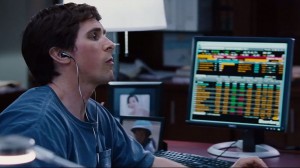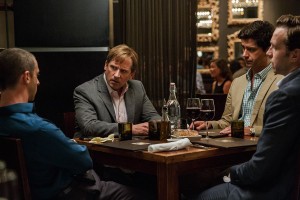
By Paul Risker.
“The point is ladies and gentlemen that greed, for lack of a better word, is good.” – Gordon Gekko in Wall Street (1987)
Desire is both a life sustaining and a destructive force, from which derives the human sin of greed. While desire is an emotional experience greed is an assault on the person that has the potential to force a regression to an individualistic mentality, void of collective or social responsibility. This human foible has been cast as a stalker of many a cinematic protagonist, from Erich Von Stroheim’s silent film Greed (1924), via the murderous Dobb’s (Humphrey Bogart) in John Huston’s The Treasure of the Sierra Madre (1948), to the vulnerable Charlie Sheen in Oliver Stone’s Wall Street, functioning as the provocateur for a compelling dramatic narrative. All three of these chosen examples show the corruption of the individual as having a spiralling outward affect – the murder of a spouse in Greed, the murder of friends in The Treasure of the Sierra Madre and the threat to the family and the wider community in Wall Street. These films attest to the consequence of the loss of a single individual’s morality, with Wall Street beginning to look at the damage the compromised collective morality can instigate.
Where however is the line between irony and this cinematic contemplation of greed that stalks our moral complex with malicious intent? One moment of irony that symbolises cinema’s prophetic side can be found in the 1980s, when in the same decade as Gordon Gekko championed greed, U.S President Ronald Reagan and British Prime Minister Margaret Thatcher began to deregulate key industries, including the financial sector. These were regulations that were put in place to prevent history repeating itself and to show that we are capable of learning from past mistakes, in this case The Wall Street Crash of 1929. In short the two leaders of the Free World performed a modern day reenactment of the Greek Myth about Pandora’s box, permitting the greed of an industry to escape – only, unlike in the original myth, here only the one evil escaped, yet it was one that has once again proven its destructive propensity. And while Wall Street looked to collective corruption, in the last three years The Wolf of Wall Street (2013) and The Big Short (2015) have continued the trajectory of looking at the fall out of collective financial corruption by way of hyper speculative aspects of contemporary finance capitalism – what could be termed the potential zenith of financial corruption.
 One of the questions The Big Short could or even should propose in the mind of the engaged viewer is the nature of or limitations of the critique of the speculative economy in films such as The Wolf of Wall Street and The Big Short; specifically, for the purposes of this review the latter. Adam McKay’s drama-comedy features a number of A-list actors: Christian Bale, Ryan Gosling, Brad Pitt and Steve Carrell, whose presence and underlying salaries would infer a significant financial investment in the film owing to its potential of a broad appeal and therein a good return on the investment at the box office, followed by home entertainment sales. Yet beneath all of this is the hope that the underlying motivation was to explore hyper speculative finance and how the perceived invincibility of the housing market was transformed into a roulette or blackjack table on which a group of morally questionable people proceeded to bet against the “Housing Bubble” not in fact bursting. McKay instills a lighthearted educative dimension to the film in which first Margot Robbie in a bubble bath explains one scenario crucial to our understanding, followed by world renowned chef Anthony Bourdain, who employs a culinary metaphor to explain his scenario. But these amusing segments with Robbie (star of The Wolf of Wolf Street) and Bourdain act as a reminder that the motivation of The Big Short is to first and foremost tell an interesting and an engaging story for its audience. And herein lies the potential limitation of the critique within McKay’s film, because while entertainment can offer a powerful critique – satire for example – if there is a limitation to the critique of hyper speculative capitalism in The Big Short then it potentially derives from the emphasis on the likeable and sympathetic protagonist – an established and some would no doubt argue imperative approach to narrative fiction if one is to create an appealing story. Yet this is born out of misunderstanding in which the keystone is not a likeable or sympathetic protagonist, but one capable of compelling our interest in spite of evoking a feeling of contempt.
One of the questions The Big Short could or even should propose in the mind of the engaged viewer is the nature of or limitations of the critique of the speculative economy in films such as The Wolf of Wall Street and The Big Short; specifically, for the purposes of this review the latter. Adam McKay’s drama-comedy features a number of A-list actors: Christian Bale, Ryan Gosling, Brad Pitt and Steve Carrell, whose presence and underlying salaries would infer a significant financial investment in the film owing to its potential of a broad appeal and therein a good return on the investment at the box office, followed by home entertainment sales. Yet beneath all of this is the hope that the underlying motivation was to explore hyper speculative finance and how the perceived invincibility of the housing market was transformed into a roulette or blackjack table on which a group of morally questionable people proceeded to bet against the “Housing Bubble” not in fact bursting. McKay instills a lighthearted educative dimension to the film in which first Margot Robbie in a bubble bath explains one scenario crucial to our understanding, followed by world renowned chef Anthony Bourdain, who employs a culinary metaphor to explain his scenario. But these amusing segments with Robbie (star of The Wolf of Wolf Street) and Bourdain act as a reminder that the motivation of The Big Short is to first and foremost tell an interesting and an engaging story for its audience. And herein lies the potential limitation of the critique within McKay’s film, because while entertainment can offer a powerful critique – satire for example – if there is a limitation to the critique of hyper speculative capitalism in The Big Short then it potentially derives from the emphasis on the likeable and sympathetic protagonist – an established and some would no doubt argue imperative approach to narrative fiction if one is to create an appealing story. Yet this is born out of misunderstanding in which the keystone is not a likeable or sympathetic protagonist, but one capable of compelling our interest in spite of evoking a feeling of contempt.
 Unlike The Wolf of Wall Street that was a difficult film too watch – attributable to an unlikeable and unsympathetic cast of protagonists – The Big Short is a more streamlined drama-comedy that places an emphasis on the inclusion of a cast of protagonists that leans more towards likeable and sympathetic. While criticism has been directed at Scorsese for his lack of condemnation of the characters in his film, I would suggest his choice to hand the process of condemnation over to his audience to be a redeeming aspect of the film, and one that contextualises the moral aspect of any critique to not solely be the responsibility of the filmmaker and film, but one that calls upon an engaged audience, and on occasion exclusively so. McKay, however, goes one step further than nurturing a cast of likeable protagonists; he lionises them. The Big Short is hence a film that condones individualistic rationales, which range from as simplistic a desire as trader Jared Vennett (Ryan Gosling) making money, to the ego-fulfilment of hedge fund manager Michael Burry (Christian Bale), and Mark Baum’s (Steve Carrell) vengeful morality against the banks, for which he frequently expresses his contempt. McKay’s choice to lionise a group of men that gamble on an event that will devastate the U.S economy and its population is a morally dubious one that inherently shows the moral limitations of the critique of the speculative economy. Yet The Big Short is able to offer a critique that looks to a series of contradictions that, while not philosophising too deeply, paint a dark portrait of the contradictions that define the human personality – individualism versus collectivism; self-preservation or the survival instinct versus the moral complex.
Unlike The Wolf of Wall Street that was a difficult film too watch – attributable to an unlikeable and unsympathetic cast of protagonists – The Big Short is a more streamlined drama-comedy that places an emphasis on the inclusion of a cast of protagonists that leans more towards likeable and sympathetic. While criticism has been directed at Scorsese for his lack of condemnation of the characters in his film, I would suggest his choice to hand the process of condemnation over to his audience to be a redeeming aspect of the film, and one that contextualises the moral aspect of any critique to not solely be the responsibility of the filmmaker and film, but one that calls upon an engaged audience, and on occasion exclusively so. McKay, however, goes one step further than nurturing a cast of likeable protagonists; he lionises them. The Big Short is hence a film that condones individualistic rationales, which range from as simplistic a desire as trader Jared Vennett (Ryan Gosling) making money, to the ego-fulfilment of hedge fund manager Michael Burry (Christian Bale), and Mark Baum’s (Steve Carrell) vengeful morality against the banks, for which he frequently expresses his contempt. McKay’s choice to lionise a group of men that gamble on an event that will devastate the U.S economy and its population is a morally dubious one that inherently shows the moral limitations of the critique of the speculative economy. Yet The Big Short is able to offer a critique that looks to a series of contradictions that, while not philosophising too deeply, paint a dark portrait of the contradictions that define the human personality – individualism versus collectivism; self-preservation or the survival instinct versus the moral complex.
 Baum alongside retired securities trader Ben Rickert (Brad Pitt), and aspiring young investors Charlie Geller (John Magaro) and Jamie Shipley (Finn Wittrock), represent the film’s dubious moral conscience. While Baum struggles with having taken advantage of the situation and Rickert tells Geller and Shipley of the stakes of betting against the U.S economy, the moral impact on a personal as well as a national level is emphasised. Meanwhile the pre-credit text informs us that Geller and Shipley attempted with no success to sue the fraudulent credit rating agencies, and their contradiction alongside Baum’s guilt and Rickert’s words of warning offers a glimmer of the collision of their greed versus their moral sensibility. And while this contradiction would appear to present a complexity to counter the insinuation of the limitations of the critique through the lionising of these characters, by touching upon individualism versus collectivism, self-preservation versus the survival instinct, in fact it does not. This is because there are fundamental limitations to the critique that is attributed to the film’s superficiality that are not so easily transcended. The Big Short, with a simplified approach, looks to recount how the events that pertain to its cast of players unfolded, and in turn making the mistake of while lionising to create a film with a broad appeal, leaving the wider aforementioned moral complexities idling. Unlike Scorsese who created a film void of morality and interested in depicting the chaos-fuelled reveries of the financial world, McKay tries to imbue his film with a moral conscience, albeit an underdeveloped and superficial one. Scorsese’s choice to avoid a crescendo of moral condemnation could define The Wolf of Wall Street as a visceral piece of filmmaking by seeking a visceral reaction of condemnation from its audience. However, alongside The Big Short it is symbolic of how the critique of the speculative economy inherently faces limitations regardless of condemnation or lack thereof. Both of these films ask continuing questions as to the reasons for the nature of these limitations, while Hollywood and the film industry make a profit off the financial crisis, and these films offer no cathartic experience for their audience.
Baum alongside retired securities trader Ben Rickert (Brad Pitt), and aspiring young investors Charlie Geller (John Magaro) and Jamie Shipley (Finn Wittrock), represent the film’s dubious moral conscience. While Baum struggles with having taken advantage of the situation and Rickert tells Geller and Shipley of the stakes of betting against the U.S economy, the moral impact on a personal as well as a national level is emphasised. Meanwhile the pre-credit text informs us that Geller and Shipley attempted with no success to sue the fraudulent credit rating agencies, and their contradiction alongside Baum’s guilt and Rickert’s words of warning offers a glimmer of the collision of their greed versus their moral sensibility. And while this contradiction would appear to present a complexity to counter the insinuation of the limitations of the critique through the lionising of these characters, by touching upon individualism versus collectivism, self-preservation versus the survival instinct, in fact it does not. This is because there are fundamental limitations to the critique that is attributed to the film’s superficiality that are not so easily transcended. The Big Short, with a simplified approach, looks to recount how the events that pertain to its cast of players unfolded, and in turn making the mistake of while lionising to create a film with a broad appeal, leaving the wider aforementioned moral complexities idling. Unlike Scorsese who created a film void of morality and interested in depicting the chaos-fuelled reveries of the financial world, McKay tries to imbue his film with a moral conscience, albeit an underdeveloped and superficial one. Scorsese’s choice to avoid a crescendo of moral condemnation could define The Wolf of Wall Street as a visceral piece of filmmaking by seeking a visceral reaction of condemnation from its audience. However, alongside The Big Short it is symbolic of how the critique of the speculative economy inherently faces limitations regardless of condemnation or lack thereof. Both of these films ask continuing questions as to the reasons for the nature of these limitations, while Hollywood and the film industry make a profit off the financial crisis, and these films offer no cathartic experience for their audience.
The Big Shortwas released by Paramount Pictures on Blu-Ray and DVD in the UK on May 23rd 2016.
Paul Risker is an independent scholar and film critic who contributes regularly to Film International. He is an Editor for Mise-en-scène: The Journal of Film and Visual Narration, which will launch in Fall 2016.
